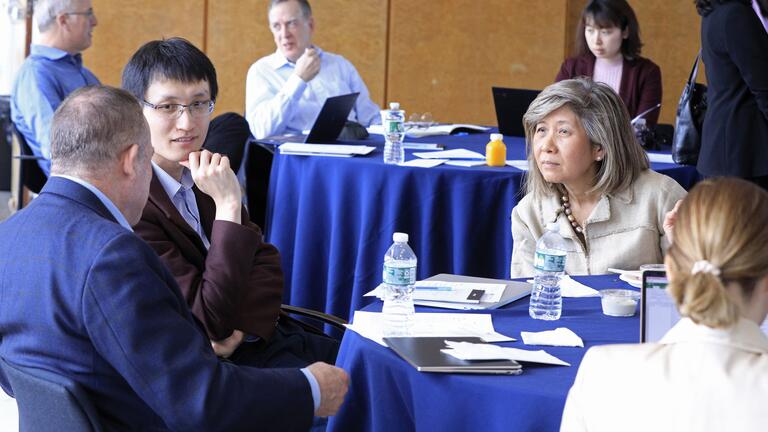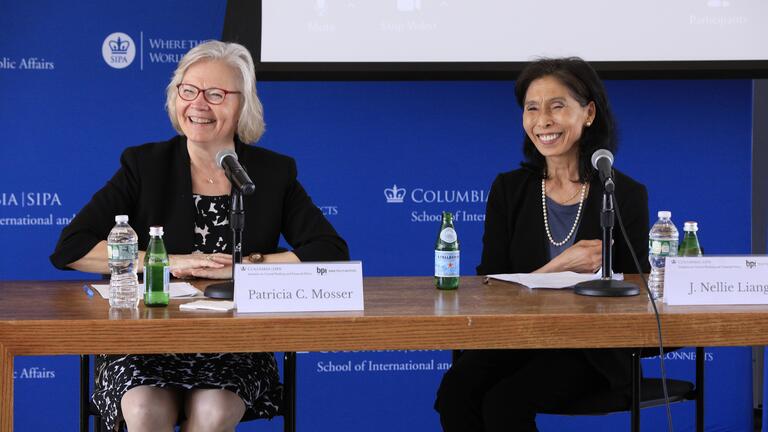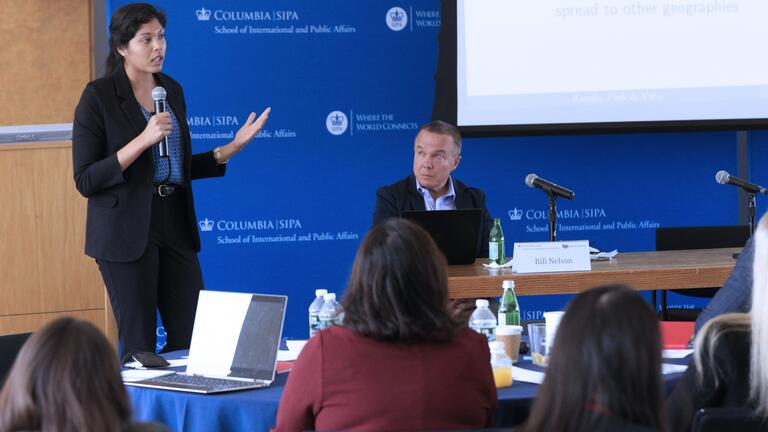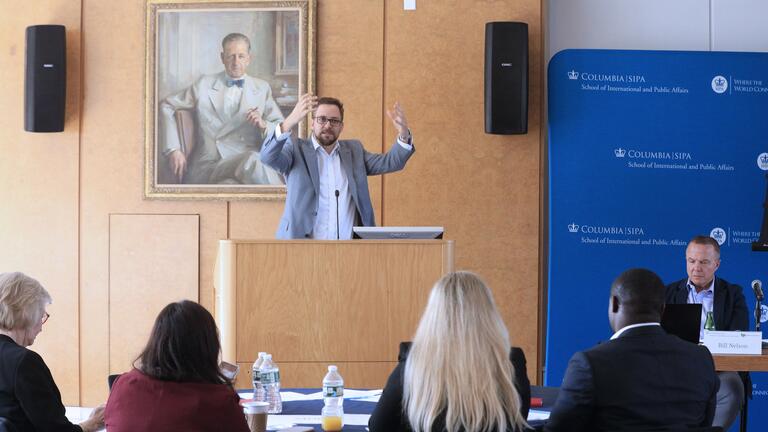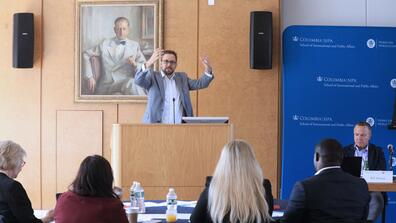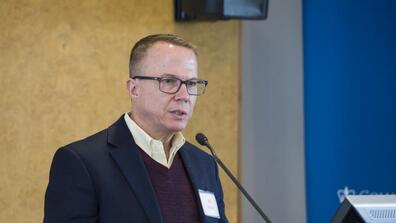6th Annual Columbia SIPA/bpi Bank Regulation Conference
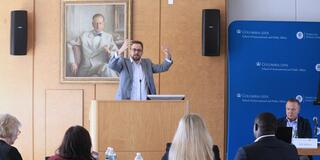
Event Date: May 26, 2022 | The International Affairs Building
Paper Session 1: Lending by banks and fintechs: soft vs hard information
- Moderator: Francisco Covas, Bank Policy Institute
- Difang Huang (Monash University) “Shadow Banking in a Crisis: Evidence from Fintech during a Crisis” [slides]
- Yao Zeng (Wharton) “Fintech Lending and Cashless Payments” [slides]
- Discussants: Julapa Jagtiani, Federal Reserve Bank of Philadelphia [slides] and William Lang, Promontor [slides]
Panel Discussion: M&A: Fintechs, banks, and competition
- Moderator: Kathryn Judge, Columbia Law School
- Panelists: Xavier Vives, IESE, Joseph Matelis, Sullivan and Cromwell and Owen Kendler, U.S. Department of Justice
Keynote
- Remarks: by J. Nellie Liang, Undersecretary for Domestic Finance, U.S Department of the Treasury
- Moderator: Patricia C. Mosser, Columbia SIPA
Paper Session 2: Measuring physical risks of climate change
- Moderator: Bill Nelson, Bank Policy Institute
- Christoph Herpfer (Emory University) “A Rising Tide Lifts Some Interest Rates: Climate Change, Natural Disasters and Loan Pricing” [slides]
- Shohini Kundu (UCLA Anderson) “The Deposits Channel of Aggregate Fluctuations” [slides]
- Discussants: Don Morgan, Federal Reserve Bank of New York [slides] and Gregory Hopper, Goldman Sachs
Paper Session 3: Impact of Regulation on Climate Risk
- Moderator: Betty Huber, Latham and Watkins
- Mathias Kruttli (Federal Reserve Board) “Banking on Carbon: Corporate Lending and Cap and Trade Policy” [slides]
- Mauricio Salgado Moreno (Humboldt University) “Climate-Related Disclosure in the UK Financial Sector and its Determinants”
- Discussants: Margaret Tahyar, Davis Polk and Linda French, JP Morgan Chase
Sponsor
- Columbia University, School of International and Public Affairs
- Bank Policy Institute
Participant bios
Participant Bios
-
Francisco Covas is currently an Executive Vice President, Head of Research at the Bank Policy Institute. Prior to joining BPI, Mr. Covas served as Senior Vice President and Deputy Head of Research at the Clearing House Association, where he helped oversee research and analysis to support the advocacy of the Association on behalf of the owner banks.
Prior to joining the Clearing House in 2016, Mr. Covas was an assistant director of the Division of Monetary Affairs at the Federal Reserve Board where he supervised a team focused on the effects of changes in bank regulation on monetary policy, on the role of banks in the transmission of monetary policy, and on the development and validation of stress testing models. Prior to that, he was an economist in the Division of Banking Supervision & Regulation and focused on a range of capital, liquidity and other regulatory initiatives.
Mr. Covas earned a Ph.D. in economics from University of California, San Diego in 2004 and a B.A. from the Universidade Nova de Lisboa, Portugal in 1997. He has written extensively on liquidity rules, capital regulation and stress testing and has published research on a wide range of journals, including American Economic Review, Journal of Money Credit and Banking, International Journal of Forecasting, among other academic journals.
-
Linda French is Executive Director of ESG Policy and Regulation for J.P. Morgan Chase, based in Washington, DC. Linda leads the firm’s Global Government Relations work on ESG-related financial policy and regulation, particularly related to climate and sustainable finance.
Prior to joining J.P. Morgan Chase, Linda led the Investment Company Institute’s (ICI) global advocacy efforts on policy issues related to sustainable finance and ESG investing. Linda has also worked in private law practice representing asset managers, funds, and fund boards; served as an attorney in the SEC Division of Enforcement; and held a variety of positions at a large asset manager. Linda holds a JD, summa cum laude, from the University of Baltimore School of Law and a BA from the University of Maryland.
-
Christoph Herpfer is a financial economist with research interests in empirical banking, law and finance. Christoph is currently an assistant professor at Emory University’s Goizueta Business School. He was trained at the London School of Economics and obtained his PhD at the Swiss Finance Institute under the Swiss Federal Institute of Technology in Lausanne. His work focuses on the use of big data to investigate questions at the intersection of banking and regulation. His interdisciplinary work has been published in leading journals across finance, accounting, law and economics.
-
Difang Huang is a Ph.D. graduate at Monash University and will join the University of Hong Kong this fall. His research interests include big data analysis and FinTech. His research has been published in Nature Human Behaviour, Journal of Financial and Quantitative Analysis, and Financial Management.
-
Greg Hopper heads the Office of New and Emerging Risks at Goldman Sachs. Previously, he was head of Enterprise Risk Management, global head of the Risk Economics Group, global head of credit quantitative modeling, head of operational risk modeling, and oversaw counterparty risk in equity derivatives, credit derivatives, loan products, and prime brokerage. He is on the Advisory Committee of the Office of Financial Research.
-
Betty Moy Huber is Global Co-Chair of Latham and Watkins ESG Practice. She advises public and private companies, funds and their boards on the full range of ESG-relate corporate governance matters, including ESG policies and disclosure, corporate culture and corporate social responsibility, sustainable finance and ‘net-zero’, SEC and other mandatory and voluntary reporting and disclosure requirements, Board oversight, risk management and composition.
Ms. Huber frequently speaks and writes for the American Law Institute, American Bar Association, ASpen Institute’s Business and Society Program, New York State and City Bar, and the Society for Corporate Governance. A former member of the Sustainability Accounting Standards Board (SASB) Advisory Council, she is regularly quoted in the financial media including the Financial Times, theWall Street Journal, Fortune and American Banker. She lectures on ESG matters at law schools including at NYU, the University of Virginia and the University of Florida.
-
Julapa is Senior Economic Advisor and Economist at the FRB Philadelphia, a Central Bank Research Fellow at the BIS, and a Fellow member of the Wharton Financial Institutions Center. At the Federal Reserve, Julapa has conducted research and participated in several supervisory policy and implementation projects, including Basel capital requirements for banks, CCAR bank stress testing, and more recently Fintech innovations and regulatory policies. She is a member of the Risk Council Fintech subgroup. Julapa has published influential research articles in top finance journals, including the Journal of Financial Economics; Journal of Money, Credit, and Banking; Journal of Banking and Finance; and Journal of Financial Stability. Her recent research has focused on issues related to Fintech innovations, the roles of alternative data and AI/ML, small business and consumer credit access. Jagtiani has a PhD in Finance and an MBA from NYU Stern School of Business, where she held the Rockefeller Foundation Fellowship.
-
Mathias Kruttli is a Principal Economist at the Federal Reserve Board in the Research and Statistics Division. His research focuses on the intersection between climate change and finance. Recent work analysed how extreme weather uncertainty is priced in financial markets and how banks manage transition risks. Before joining the Federal Reserve Board, Mathias completed a PhD in economics at the University of Oxford and worked in investment banking and strategy consulting.
-
Kathryn Judge is the Harvey J. Goldschmid Professor of Law at Columbia Law School. She currently serves as co-managing editor of the Journal of Financial Regulation and as a research member of the European Corporate Governance Institute. Previously, she served on the Financial Stability Task Force co-sponsored by the Brookings Institution and Chicago Booth School of Business and as a member of the Financial Research Advisory Council of the Office of Financial Research. Her work has been published in Harvard Law Review, Stanford Law Review, The University of Chicago Law Review and other top journals. She is also the author of the forthcoming book, DIRECT: The Rise of the Middleman Economy and the Power of Going to the Source (Harper Business).
-
Owen Kendler serves as Chief of the Financial Services, Fintech & Banking Section at the Antitrust Division U.S. Department of Justice. Owen has led and managed numerous merger and conduct investigations in a wide range of industries including financial services, media, and online advertising. Previously, he was an Assistant Chief in the Telecommunications Section and Counsel to the Assistant Attorney General for Antitrust.
-
Shohini Kundu is an Assistant Professor of Finance at the Anderson School of Management at University of California, Los Angeles. Her research focuses on financial intermediation, regulation, corporate finance and macroeconomics. She was a finalist in the ECB’s Young Economists’ Competition, and received the BlackRock Applied Research Award, Qatar Centre for Global Banking and Finance Young Economist Prize, WFA Award for Outstanding Research, Eugene F. Fama Fellowship, and Stigler Center Dissertation Award for her doctoral work. She holds a PhD in Finance and MBA from the University of Chicago Booth School of Business, and a BA in Economics from Cornell University.
-
Nellie Liang was confirmed as the Under Secretary for Domestic Finance at the U.S. Treasury Department on July 15, 2021. Prior to serving at Treasury, Liang was a Senior Fellow in Economic Studies at the Brookings Institution. She also was a Visiting Scholar at the International Monetary Fund’s Monetary and Capital Markets Department, Lecturer at the Yale School of Management, and a member of the Congressional Budget Office’s Panel of Economic Advisors. Over three decades at the Board of Governors of the Federal Reserve System, Liang held a range of positions, including as the first Director of the Division of Financial Stability from 2010 to 2017. In that position, she oversaw the development of financial stability policies related to risks in financial firms and financial markets, and interactions of financial policies with monetary policy. Her recent research has focused on the financial system and macroeconomic growth. Liang received a Ph.D. in economics from the University of Maryland and a B.A. in economics from the University of Notre Dame.
-
Bill heads Promontory’s quantitative practice supporting financial firms in the development and validation of quantitative risk analytics. Prior to joining Promontory, Bill served as executive vice president for supervision at the Federal Reserve Bank of Philadelphia. In 2010-2011, he served as acting head of risk for Federal Reserve supervision where he co-chaired the risk committee for systemically important banks, oversaw the Federal Reserve’s review of mortgage foreclosure practices, and provided numerous briefings to Board Governors on banking issues. Bill led the development and implementation of the model validation program for the Federal Reserve’s stress testing models. Prior to joining the Federal Reserve, Bill served as head of Special Studies at the Office of the Comptroller of the Currency and on the economics faculty of Rutgers University. He holds a Ph. D. in economics from Yale University.
-
Joseph Matelis is a partner at Sullivan & Cromwell. His practice focuses on antitrust matters, including merger reviews, other civil and criminal government proceedings involving competition issues, litigation, and counseling. He has counseled clients on a number of bank mergers.
-
Don Morgan is an Assistant Vice President in the Research Department at the Federal Reserve Bank of New York. His articles on monetary policy, banking, and household finance have been published in the American Economic Review, the Quarterly Journal of Economics, and other academic journals. His latest work studies the impact of weather disasters on banks. His findings have been covered by the Wall Street Journal, The American Banker, the Economist, Freakonomics radio, and other media. He has taught at Columbia University, New York University and is a Fellow at the Wharton’s Center for Financial Institutions. Don earned his Ph.D. Economics from the University of Wisconsin.
-
Patricia C. Mosser is Director of the MPA Program in Economic Policy Management at Columbia University’s School of International and Public Affairs and leads the school’s Initiative on Central Banking and Financial Policy. Previously, she was head of Research and Analysis at the Office of Financial Research, U.S. Treasury. Mosser spent over 20 years at the Federal Reserve Bank of New York where she was senior manager at the New York Fed’s open market desk overseeing financial market analysis, monetary policy implementation, crisis-related facilities, foreign exchange and investment operations financial stability and reform. Previously she served on the FSOC Deputies Committee and as a board member of the American Economic Association’s Committee on the Status of Women in the Economics Profession. Currently, she serves as an outside director of Nomura Holdings Incorporated. She received a BA from Wellesley College, an MSc with distinction from the LSE, and a PhD from MIT.
-
William Nelson is an Executive Vice President and Chief Economist at the Bank Policy Institute and an adjunct professor at Georgetown University. Previously he served as Executive Managing Director, Chief Economist, and Head of Research at the Clearing House Association and Chief Economist of the Clearing House Payments Company. Mr. Nelson contributed to and oversaw research and analysis to support the advocacy of the Association on behalf of TCH’s owner banks.
Prior to joining The Clearing House in 2016, Mr. Nelson was a deputy director of the Division of Monetary Affairs at the Federal Reserve Board where his responsibilities included monetary policy analysis, discount window policy analysis, and financial institution supervision. Mr. Nelson attended Federal Open Market Committee meetings and regularly briefed the Board and FOMC. He was a member of the Large Institution Supervision Coordinating Committee (LISCC) and the steering committee of the Comprehensive Liquidity Analysis and Review (CLAR). He has chaired and participated in several BIS working groups on the design of liquidity regulations and most recently chaired the CGFS-Markets Committee working group on regulatory change and monetary policy. Mr. Nelson joined the Board in 1993 as an economist in the Banking section of Monetary Affairs. In 2004, he was the founding chief of the new Monetary and Financial Stability section of Monetary Affairs. In 2007 and 2008, he visited the Bank for International Settlements, in Basel, Switzerland, where his responsibilities included analyzing central banks’ responses to the financial crisis and researching the use of forward guidance by central banks. He returned to the Board in the fall of 2008 where he helped design and manage several of the Federal Reserve’s emergency liquidity facilities.
Mr. Nelson earned a Ph.D., an M.S., and an M.A. in economics from Yale University and a B.A. from the University of Virginia. He has published research on a wide range of topics including monetary policy rules; monetary policy communications; and the intersection of monetary policy, lender of last resort policy, financial stability, and bank supervision and regulation.
-
I am a Ph.D. Candidate at the Berlin School of Economics (BSE, formerly known as BDPEMS) and a research and teaching assistant at the Institute of Economic Policy at the Humboldt Universität zu Berlin. Moreover, this Fall I will join the Bank of England’s PhD Research Programme under the Monetary Analysis area.
My main interests are Macro-Finance and Climate-Macro using both theoretical and empirical methods. Specifically, my research concentrates primarily on the role of the central bank’s operational framework for the transmission of monetary policy. For example, in my Job Market Paper, I examine the effects of the Federal Reserve’s 2008 operational framework switch on the transmission mechanism of conventional monetary policy.
-
Meg Tahyar is Partner and co-head of David-Polk’s Financial Institutions practice and a member of our Fintech team. She provides strategic bank and financial regulatory advice to clients including many of the largest U.S. and non-U.S. financial institutions, regional banks, fintechs, cryptocurrency exchanges and other digital assets companies.
She has been involved in several regional bank mergers and acquisitions and has worked on almost two dozen living wills for clients ranging from the largest financial institutions to smaller regional banks. She also advises clients on corporate governance, consent order remediation, bank chartering, payment systems, fintech partnerships, bank powers and activities, cryptocurrencies, digital assets, securities disclosure, capital and liquidity and the government’s COVID support programs.
-
Xavier Vives is professor of Economics and Finance at IESE Business School. He holds a Ph.D. in Economics from UC Berkeley. His is a Fellow of the Econometric Society; of the European Economic Association; and of the Academia Europae. He was President of the European Association for Research in Industrial Economics for 2016-2018 and is currently Vice President of the European Finance Association. He has taught at INSEAD, Harvard University, Universitat Autònoma de Barcelona, Universitat Pompeu Fabra, UC Berkeley, University of Pennsylvania, and New York University. He has published more than a hundred articles in the main international journals. He is currently co-editor of JEMS and former editor of JET and JEEA. Dr. Vives has served as advisor for the World Bank, the Inter-American Development Bank, the European Commission, the Federal Reserve Bank of New York, as well as for international corporations. He has been a Duisenberg Fellow of the European Central Bank served as Special Advisor to the EU Commissioner for Competition, Mr Joaquín Almunia.
-
Yao Zeng is an Assistant Professor of Finance at the Wharton School, the University of Pennsylvania, and also a policy consultant to the Financial Stability Board. He works on the intersection of asset pricing and corporate finance with a focus on financial intermediation. His current research explores the interaction between banks and various non-banks including mutual funds, ETFs, and various FinTech companies, and has been published in leading journals including the Journal of Finance, the Journal of Financial Economics, and the Review of Financial Studies. He received his Ph.D. in Economics from Harvard University in 2016.
